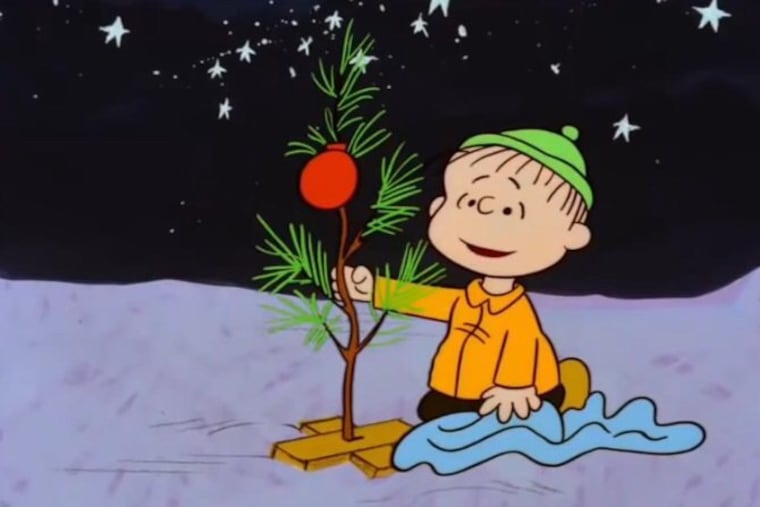Lee Mendelson, guiding light of ‘A Charlie Brown Christmas,’ dies at 86
Lee Mendelson, the prolific producer who guided “A Charlie Brown Christmas” to television, which became an instant holiday classic in 1965 and has since delighted tens of millions of viewers, has died. He was 86.

Lee Mendelson, the prolific producer who guided “A Charlie Brown Christmas” to television, which became an instant holiday classic in 1965 and has since delighted tens of millions of viewers, has died. He was 86.
Mendelson died Wednesday at his Bay Area home in Hillsborough, Calif., of lung cancer and congestive heart failure, according to his son Jason Mendelson. The family had gathered at his home to celebrate Christmas.
“As he would have put it, it was serendipitous to go on Christmas Day — a day when the song that he wrote was playing every 10 minutes on radio stations,” Jason Mendelson told The Times. Lee Mendelson also wrote the lyrics to the iconic song “Christmastime Is Here,” which became the special’s signature song.
Mendelson, according to his son, often told his family that serendipity nudged him toward “Peanuts.” Without his efforts, Charlie Brown, Linus Van Pelt, Snoopy and the rest of the “Peanuts” gang might never have endured all these years on the small screen.
The San Francisco native produced film documentaries before persuading a skeptical cartoonist, Charles M. Schulz, to adapt his beloved characters for television. Lee Mendelson first teamed with Schulz on the documentary “A Boy Named Charlie Brown.” Although that special never aired, it began a nearly 40-year collaboration among the two men and a former Disney animator, Bill Melendez, who sketched the Peanuts characters.
Before meeting Mendelson, the publicity-shy Schulz, a Midwesterner who had migrated to Sebastopol, Calif., had spurned numerous TV offers to capitalize on his newspaper comic strip. Schulz initially gave Mendelson the brushoff, too, Mendelson recalled in a 2015 interview with The Times.
Mendelson said he pitched a movie about Schulz’s life and the creation of the “Peanuts” comic strip. At the end of the conversation, Mendelson added that he had made a documentary about Willie Mays, the baseball great whom Schulz loved. That show had become a hit on NBC. There was a pause.
“Well,” said Schulz, who died in 2000 at age 77, “if Willie Mays can trust you with his life, maybe I can trust you with mine.”
Later, an advertising agency that represented Coca-Cola was searching for family-friendly TV shows to sponsor, and it called Mendelson to ask whether his team could create a “Peanuts” Christmas special in just six months. Mendelson said yes, even though he later acknowledged that he wasn’t certain such a project would be feasible in such a short time frame.
He told Schulz about the Christmas special, and the cartoonist asked Mendelson what the story would be. “Something you’re going to write tomorrow,” Mendelson recalled saying to Schulz.
Schulz quickly sketched a story about Charlie Brown’s humiliating effort to direct the school Christmas play. According to David Michaelis’ 2007 biography, “Schulz and Peanuts,” Mendelson suggested that a holiday tree be included as a plot point, and Schulz warmed to the idea. Charlie Brown would adopt a sad little Christmas tree that everyone else ridiculed and try to make it the centerpiece of the school play.
At the cartoonist’s insistence, Mendelson hired Melendez, a former Disney animator who had worked on the “Peanuts” characters in a series of Ford commercials. Schulz felt Melendez’s animations stayed true to the spirit and art of his creations. For music, Mendelson turned to an acclaimed Bay Area jazz pianist and composer, Vince Guaraldi.
Schulz said OK even though he hated jazz.
But two other major creative decisions led to disagreement — and also helped ensure that “A Charlie Brown Christmas” remained unique in its approach to the holiday.
Schulz insisted that no laugh track be used. At the time, canned laughter was a virtual requirement for TV comedy. Mendelson pleaded that without it, the special would plod along. But Schulz detested laugh tracks and would not budge, according to the Michaelis biography.
The other standoff involved religion. The script included a climactic speech in which Linus delivered an onstage explanation of the “true meaning of Christmas” by reciting the story of Jesus’ birth according to St. Luke.
Mendelson, the producer, felt religion should be kept out of prime-time entertainment. But Schulz was insistent: “We can’t avoid it.”
Audiences quickly embraced “A Charlie Brown Christmas,” which initially ran on CBS, as a seasonal parable of redemption, well in keeping with “A Christmas Carol” and “It’s a Wonderful Life.” The premiere was seen by more than 15 million U.S. households, with 45% of TVs in use that night tuned in to the program, according to Nielsen.
CBS promptly ordered up more “Peanuts” specials, including “It’s the Great Pumpkin, Charlie Brown,” which premiered in 1966 and became a Halloween staple.
“It became part of everybody’s Christmas holidays,” Lee Mendelson told The Times in 2015. “It was just passed on from generation to generation. … We got this huge initial audience and never lost them.”
Mendelson, Schulz and Melendez produced 50 television specials and four animated feature films, according to the Charles M. Schulz Museum. Mendelson won 12 Emmy Awards from 45 nominations.
He is survived by his wife, Ploenta, and her son Ken; his four children: Glenn, Lynda, Jason and Sean; and eight grandchildren: Palmer, Lena, Kyler, Logan, Jillian, Talyn, Ronan and Zander.